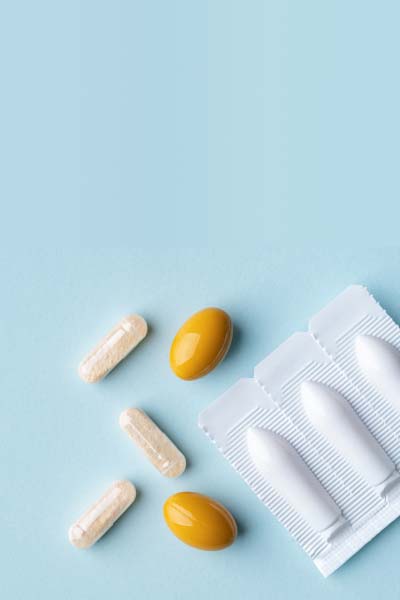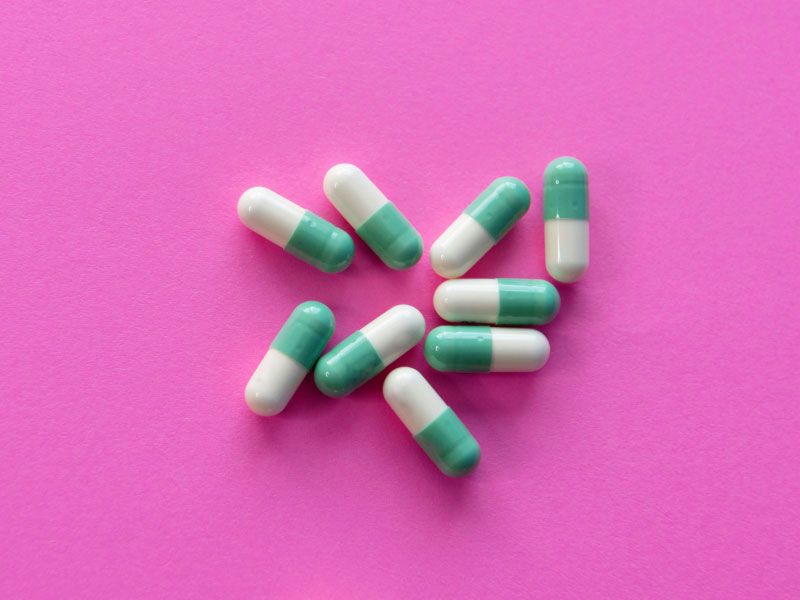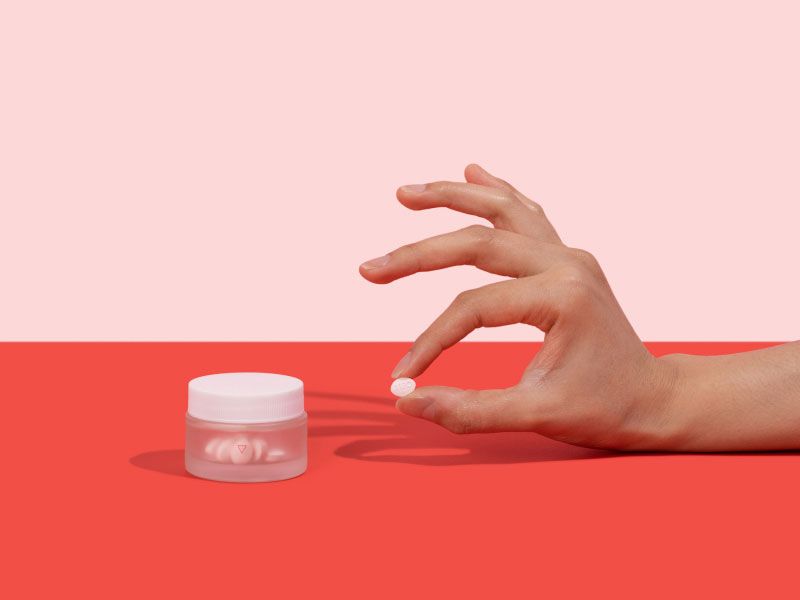
What Is a Yeast Infection?
Published on April 13, 2021
Updated on January 5, 2026
Written by Kathleen Morrison
Medically Reviewed by Andrea Sleeth WHNP-BC, MSCP
Key takeaways
- Yeast infections happen when vaginal yeast grows out of balance, often triggered by antibiotics, hormones, stress, diet, and your menstrual cycle—if you’re going through menopause, you might experience them more often.
- Common signs include itching, irritation, redness, clumpy discharge, and discomfort during sex or urination.
- Over-the-counter antifungal creams or suppositories work for mild infections, while prescription options target more stubborn or recurrent cases.
- Simple habits—like breathable clothing, gentle hygiene, and probiotics—can help support vaginal health.
- Persistent, recurring, or severe symptoms warrant a consultation with a healthcare provider to get the right diagnosis and treatment.
Yeast infections (vaginal candidiasis) are more common than people think, but they’re still not comfortable dinner table conversation.
Even though they’re annoying and uncomfortable, a yeast infection doesn’t mean something is seriously (or permanently) wrong with your body. It usually just means the delicate system that keeps yeast in check needs a little help getting back in order. Learning how to handle and manage these infections with finesse, and prescription yeast antifungals, can give you some peace of mind and get you back to feeling your best.
Yeast Infections: The Basics
So, what even are they? This is a fungal infection that happens when the natural balance of yeast in your vagina is disturbed, leading to itching, irritation, and other annoying symptoms.
Things like stress, taking antibiotics, or eating too much sugar (IKYKY) can make it easier for yeast to grow, throwing things out of balance.
What Causes Yeast Infections?
Vaginal yeast infections usually happen when the balance of healthy bacteria in your body gets thrown off. A few common things can trigger that imbalance:
- Antibiotics: Taking antibiotics for a while can lower your good bacteria, giving yeast a chance to grow.
- Hormonal changes: Birth control or pregnancy can sometimes make yeast more likely to thrive.
- Stress and lack of sleep: When your body’s defenses are down, yeast can spread more easily.
- A high-sugar diet: Yeast loves sugar, so cutting back on sweet stuff can help keep things in check.
- Hygiene habits: Wiping from back to front after using the bathroom can move unwanted microbes toward the vaginal area. Keep in mind that douching can wash away the good bacteria that help maintain balance down there.
Being aware of what might trigger yeast overgrowth gives you the power to take simple steps to keep things feeling comfortable and balanced.
Risk factors for Yeast Infections
There are also certain situations that can make you more likely to experience vaginal infections. Some of these include:
- Diabetes: When blood sugar isn’t well-managed, yeast has more glucose to feed on.
- Weak immune systems: Things like chemotherapy or HIV can make it harder for your body to fight off infections.
- Tight clothing: Clothes that trap moisture, especially around the vaginal area, create a warm, yeast-friendly environment.
- Synthetic underwear: Fabrics that don’t breathe can make it easier for yeast to thrive.
- Menstruation: Hormonal changes during your period can alter pH levels, which may encourage yeast growth.
- Frequent sexual activity: This can lead to irritation, increasing the chances of an infection.
Knowing these risk factors can help you make informed choices and take action to support your body’s natural balance.
Yeast Infection Symptoms
Sometimes, it can be a bit tricky to figure out what's up, because the symptoms of a yeast infection can be pretty similar to other things. But once you start paying attention to what’s typically going on, it gets easier to spot the signs.
Common signs to look out for
- Redness: If you notice redness around your vagina, it could be a sign that something’s off.
- Vaginal itching: That intense itching that drives you up the wall? Yup, yeast infection.
- Swelling: Swelling near the labia can make everyday things like wiping feel a little uncomfortable.
- Burning: A mild burning feeling when you pee might happen if the skin is irritated. Not fun, right?
- Changes in discharge: If your discharge starts to look thick and clumpy (think cottage cheese), that’s one of the classic signs.
- Dryness or rawness: Feeling dry or raw down there could also mean it’s time to think about grabbing some over-the-counter creams or calling your healthcare provider.
- Pain during sex: If sex starts feeling uncomfortable, it’s worth paying attention to as well.
Everyone’s body is unique, so keeping track of any changes or patterns over time can help you stay on top of things. Most vaginal yeast infections clear up quickly, but if symptoms persist, worsen, or don’t respond to simple remedies, it might be time to take a closer look. An at-home yeast infection test can be a convenient first step to help you understand what’s going on. If the results are unclear or symptoms continue, follow up with a healthcare provider. The sooner you take action, the quicker you’ll feel better—plus, it’ll help you avoid bigger issues down the line.
How Yeast Infections are Diagnosed
Getting a clear answer is the fastest way to feel better. Healthcare providers usually start by asking about your symptoms and medical history. A quick pelvic exam can check for redness or swelling, and a swab of your discharge may be looked at under a microscope to spot fungal cells.
If there’s a chance something else is causing your symptoms—like BV or an STI—your provider might run extra tests. Some clinics even offer rapid kits for faster results. For recurring infections, a lab culture can show which medication will work best.
The process is generally quick and straightforward, so you can get a clear diagnosis and start the right treatment without guessing.
While the process may sound a little intimidating, it’s usually quick and easy. Getting your yeast infection diagnosed and finding clear answers means you can move forward with a treatment plan that works for you without any extra surprises. And that’s always a win!
Treatment Options for Yeast Infections
We get it—figuring out how to treat yeast infections can feel a little overwhelming, but you’ve got this. Whether you’re looking for something quick from the pharmacy or need more targeted options for recurring or intense symptoms, there are options to suit your needs. Most yeast infections respond well once you find the prescription treatment that works for you.
Over-the-counter solutions
A lot of people start with over-the-counter antifungal creams or suppositories to support vaginal yeast infections, which you can pick up at your local pharmacy. You’ll find popular ingredients like miconazole or clotrimazole that help tackle yeast in the vaginal area.
Some treatments last just one day, while others may go on for a week, so be sure to follow the instructions. You can choose between ointments, creams, and intravaginal suppositories, depending on what feels most comfortable for you.
Over-the-counter treatments provide support for mild infections, especially if you catch them early, but for more persistent issues, it’s always a good idea to seek advice from a healthcare provider.
Probiotics are another vaginal support option you might consider, with the idea of balancing vaginal flora—but results can vary from person to person, and this shouldn’t be a replacement for treatment, just a helpful add-on.
Prescription Treatments
If over-the-counter options aren’t doing the trick, your healthcare provider might recommend prescription oral antifungal medication or a stronger topical treatment. Fluconazole, a common pill, sometimes does the job with just a single dose, tackling the infection from the inside.
For more severe or long-lasting infections, a longer treatment plan or a stronger gel-based option may be needed. If yeast infections tend to be a frequent guest, your provider may suggest a longer regimen to help maintain balance. Make sure to let your provider know about any other medications you’re taking to avoid any unwanted interactions.
Following the instructions carefully will help you get back on track faster and avoid any repeat infections. Side effects are usually mild, but if anything feels off, don’t hesitate to check in with your healthcare provider. Things to look out for include:
- Headaches
- Nausea
- Abdominal pain
- Dizziness
Wisp treatment options are available only after consultation with a licensed medical professional. You should consult with your healthcare provider before starting a new supplement or treatment regimen. Individual results may vary.
OTC vs. prescription yeast infection treatments
When it comes to yeast infections, not all treatments are created equal—and knowing the difference can save you time, discomfort, and guesswork.
Over-the-counter options
- Usually come as creams, ointments, or suppositories.
- Works well for mild, first-time infections.
- Convenient and easy to grab at the pharmacy.
- Might not fully clear the infection, especially if it’s recurring or severe.
Prescription treatments
- Oral pills like fluconazole tackle the infection from the inside and can sometimes work with just a single dose.
- Stronger topical gels or multi-day regimens are available for stubborn or frequent infections.
- Your provider can tailor the treatment to your history, symptoms, and other medications you take.
- Prescription options often give faster relief and help lower the risk of repeat infections.
Bottom line: OTC treatments may help with mild flare-ups, but prescription options offer a stronger, more targeted approach. Talking to a healthcare provider ensures you’re getting the right solution for your body.
Tips for Vaginal Health and Comfort
Taking control of your sexual health doesn’t have to be complicated! Small, simple habits can make a world of difference when it comes to feeling comfortable and keeping your vaginal area happy. You don’t need a full-on lifestyle overhaul—just a few tweaks to your daily routine can help keep things in balance.
Everyday habits to support vaginal health
Go for breathable fabrics: Choose cotton underwear to keep things fresh and let air flow through. It’s a game changer for comfort and moisture control.
Change out of sweaty clothes quickly: After a workout or a long walk, get out of damp clothes ASAP! It helps keep yeast from finding a comfy spot to thrive.
Shower after swimming: A quick rinse after a swim can wash away chlorine and any bacteria that could irritate your vaginal area, leaving you feeling fresh.
Stay hydrated: Drink lots of water—it’s a simple way to support your body’s natural balance and help everything function smoothly.
Use pH-balanced lubricants: Go for water-based lubes that are gentle on your vaginal area and won’t throw off your natural balance.
Keep soaps gentle: Use mild, unscented soaps for your daily cleanse. Stay away from harsh products that can irritate your sensitive skin, and never use them internally—the outside of your vulva is enough.
Limit douching: Douching can mess with the healthy bacteria your body needs to stay in balance, so it’s a good idea to avoid it.
Prioritize rest: Sleep is your body’s best friend when it comes to immune health. A good night’s rest helps your body do its thing and keep you feeling your best.
Wear loose-fitting clothes: Loose clothes let your body breathe, helping to avoid trapped moisture and unnecessary discomfort.
Use panty liners sparingly: Panty liners can trap moisture, so use them only when necessary. Let your body breathe as much as possible.
Consider probiotics: Some people find that probiotics, especially those with Lactobacillus strains, can help keep things balanced in both your gut and vaginal area.
By incorporating these simple, everyday habits into your routine, you’ll likely feel more comfortable and confident about your vaginal health. Remember, everyone’s body is unique, so it’s important to listen to yours and figure out what works best for you!
Living with Yeast Infections
Dealing with recurring yeast infections can be super frustrating, but you’re not alone, and there are definitely ways to make things easier. By tuning into your body and figuring out what might be triggering those flare-ups, you can build a routine that helps you stay comfortable and feel more in control.
How long does a Yeast Infection Last?
A mild yeast infection typically lasts a few days to a week, especially with prescription treatment. If left untreated, it might stick around longer or worsen over time. Chronic or recurrent infections may last longer and require more aggressive treatment.
If it’s not going away after two weeks, it's best to consult a healthcare provider for further evaluation.
Managing recurrent infections
If yeast infections seem to be a recurring issue, it might help to develop a long-term strategy to manage them. Your healthcare provider might recommend a prescription antifungal treatment plan, whether it’s a series of oral doses or a longer topical treatment. And if you’ve been using the same medication for a while, switching things up could be a good move if it’s not working as well anymore.
Stress can also play a role in how often yeast infections pop up. Stress can weaken your immune system which makes it harder for your body to fight off infections, so incorporating relaxing activities into your routine—like yoga, meditation, or anything that helps you unwind—can be really beneficial. You might also want to choose breathable fabrics for your clothes and underwear, which can make a big difference.
Catching symptoms early, like itching or irritation, can often stop an infection from getting worse. Regular check-ups can help you stay on top of things and nip any small imbalances in the bud, keeping you feeling more balanced overall.
With the right mix of treatment, stress relief, and healthy habits, you’ll likely see fewer flare-ups and feel more comfortable in your body.
Can a yeast infection cause bleeding?
A yeast infection can sometimes lead to a little light bleeding or spotting, but it’s usually not heavy. Here’s why it might happen:
- Irritation and inflammation: The fungal overgrowth can inflame the vaginal lining, making it a little more sensitive and prone to minor bleeding.
- Scratching or friction: Itchy symptoms or friction during sex can cause small tears or irritation that result in spotting.
- Co-existing conditions: Sometimes what seems like a yeast-related bleed could actually be from another infection, cervical irritation, or an unrelated health issue.
If you notice bleeding, especially if it’s persistent, heavy, or accompanied by other unusual symptoms, it’s definitely time to check in with a healthcare provider. Getting a proper diagnosis will help make sure you’re treating the right issue and keep things simple and stress-free.
When to see a doctor
If you’re not getting the relief you need from your standard care or if infections keep happening, it might be time to see a healthcare provider.
Persistent itching, painful urination, or unusual discharge could be signs that there’s something else going on that needs attention. Taking care of any yeast infection properly is important to make sure you’re addressing the right issue.
Sometimes, recurring infections could point to other health things, like imbalances in blood sugar, so it’s good to be thorough. Plus, telehealth appointments are a great option if you’d prefer to stay home—your provider can suggest new options, lifestyle changes, or other ways to help you feel your best.
The sooner you take action, the sooner you’ll be back on track, feeling better and with less stress.
Yeast infection healing signs
Knowing when a yeast infection is on the mend can help you feel more confident about your recovery and what’s safe to do. Healing isn’t instant, and symptoms can linger a little even as your infection is clearing. Paying attention to the signs your body is improving helps you track progress without overdoing treatment or stressing out.
Common signs your yeast infection is in its late healing stages:
- Reduced itching and irritation
- Less redness or swelling around the vaginal area
- Discharge thinning and returning to normal consistency
- Less burning during urination
Things to keep in mind:
- Taking more medicine than prescribed doesn’t speed up healing
- It’s usually only safe to have sex once your symptoms have left the building and the infection is fully cleared
- Lingering symptoms don’t always mean treatment isn’t working—healing can be gradual
By tuning in to these cues, you can celebrate the small wins and feel more in control while your body finishes the job.
Managing Yeast Infections with Confidence
Yeast infections are super common and nothing to be embarrassed about. They can happen to anyone, and taking action early can help stop discomfort like itching from interrupting your day.
Small habits like wearing breathable fabrics and watching your sugar intake can help create a solid foundation for your health. By tuning into your body and identifying triggers, like stress or hygiene habits, you can manage things more easily.
Getting professional care is always a good idea if symptoms persist. A personalized plan can help you stay ahead of flare-ups and keep you feeling confident about your health.
A yeast infection doesn’t have to disrupt your routine. With the right steps, you can stay in control and feel your best.
Wisp is here for discreet, judgment-free support whenever you need it. Whether you need expert advice, a tailored prescription treatment plan, or just reassurance, we’ve got you covered. Reach out today and take charge of your sexual health!
This blog post is for informational and educational purposes only and should not be taken as professional advice. Always consult with a qualified professional before making any decisions based on the information provided here.




